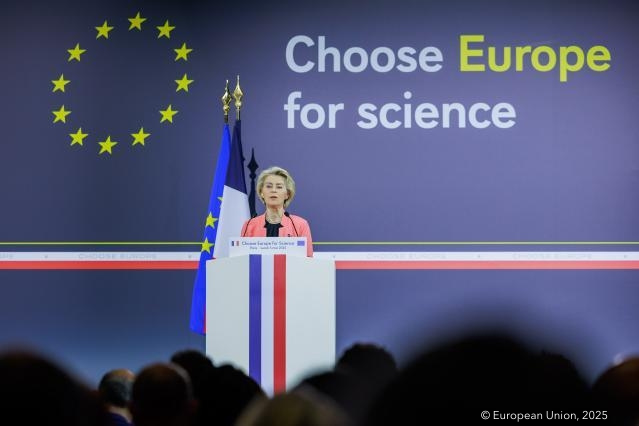
On 5 May, European Commission President Ursula von der Leyen launched the “Choose Europe for Science” initiative. The half-billion-euro plan, running from 2025 to 2027, aims to attract foreign researchers and responds to recent crackdowns on research freedom and open science globally, notably in the United States. Speaking from Paris’ Sorbonne University, von der Leyen did not directly refer to the US, while French President Emmanuel Macron, who also spoke at the launch, was more explicit, stating that it would have been unimaginable, just a few years ago, for one of the world’s largest democracies to abolish research programmes on the grounds that they included references to diversity.
The “Choose Europe for Science” initiative rests on three pillars: the promotion of open science, investments, and fast tracking the innovation cycle, from basic research to market, relying on the Union’s “stable and predictable” funding opportunities, as well as its modern infrastructure, and comfortable working conditions thanks to a strong welfare system. When it comes to financing, the €500 million budget will in part allow the creation of a new European Research Council (ERC) financing instrument offering larger, longer-term “super grants,” lasting seven years instead of the usual five, in order to offer longer-term perspectives to researchers. However, few details have yet transpired, as the ERC’s Scientific Council is still developing the grants’ operational details. Besides this new scheme, the budget is also expected to cover the costs of bringing foreign scientists to Europe, with the amount allocated to this doubled for 2025, and this support set to be extended to 2026 and 2027.
In addition, the event provided an opportunity for the Commission President to once again set out her research and innovation roadmap for the mandate, this time presented as an integral part of the Choose Europe plan, namely the forthcoming “European Innovation Act,” the “Startup and Scaleup Strategy,” and the “European Area Act”. The first of these legislations intends to enshrine freedom of scientific research into law, while the others should tackle the difficulties in bringing fundamental research to market. Moreover, she recalled the objective for EU member states to spend 3% of their GDP on research by 2030, which has so far proven difficult to comply with, and promised ambitious research and innovation funding for the 2027-2034 Multi-Annual Financial Framework (MFF).
Beyond increasing Europe’s attractivity for researchers, von der Leyen also highlighted other challenges to address, such as the complex bureaucracy faced by researchers, and the importance of strengthening the free movement of knowledge and data across Europe. She notably cited frontier research fields, such as artificial intelligence, quantum, space, semiconductors, microelectronics, digital health, genomics and biotechnology as some of the EU’s priorities. While climate and energy research are not mentioned, Europe’s push is likely to attract researchers from the field, as the US administration continues to target climate change research, and recently dismissed 400 scientists contributing to the Congress-mandated sixth National Climate Assessment (NCA).